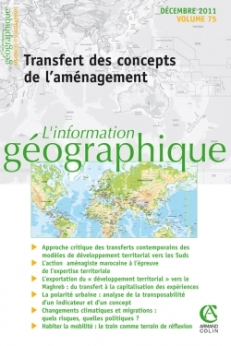
L'information géographique - Vol. 75 (4/2011)
Pour acheter ce numéro, contactez-nous
Recevez les numéros de l'année en cours et accédez à l'intégralité des articles en ligne.
La relation entre urbanisation et développement est un nouveau paradigme majeur dans le sud au début du XXIe siècle. Cette nouvelle équation pose évidemment de nouvelles et redoutables questions. On tente ici d’apporter quelques réponses sur la base d’études empiriques conduites depuis presque vingt ans. Le papier revient sur la pratique de l’auteur d’analyse et de la mesure de la polarité urbaine en Allemagne de l’Est, en Algérie et en Afrique subsaharienne dans une double perspective : s’interroger sur la mesure des effets des agglomérations dans un contexte de globalisation ; s’interroger sur la portée de ces mesures et des concepts qui les sous-tendent, et donc sur la transposabilité à l’Est, en Afrique du Nord et en Afrique subsaharienne des outils développés en Europe occidentale dans la science régionale. La principale conclusion est que si la polarité urbaine est bien un des principaux facteurs explicatifs des performances régionales au nord, c’est plus compliqué à l’est et au sud. En Algérie cette variable n’a pas d’effet sur les performances régionales, contrairement à d’autres indicateurs comme l’agglomération et la métropolisation, et en Afrique subsaharienne l’effet-ville est manifeste mais tend à s’émousser. Cela souligne la nécessité de revisiter pour les PED la réflexion sur l’effet développant des villes et sur leur transcription spatiale.
The relation between urbanisation and development is a new major paradigm in the global South at the beginning of the 21st century. This new equation raises obviously new and difficult questions. One has tried here to bring some answers on the basis of empirical studies conducted in the last 20 years. The paper reconsiders the practice of the author of analysing and measuring the urban polarity in East Germany Algeria and sub-Saharan Africa from a double point of view: investigating the measurement of the effects of the agglomerations in a context of globalisation on the one hand and, on the other hand, questioning the range of these measurements and the concepts which underlie them, and thus about the transferability in East, in North Africa and sub-Saharan Africa of the tools developed in Western Europe in regional science. The principal conclusion is that if the urban polarity is undeniably one of the main explanatory factors of the regional performances in industrialised countries, it is less clear elsewhere. In Algeria, this variable does not have any effect on regional performances, contrary to other indicators like agglomeration and metropolisation, and in sub-Saharan Africa, the city-effect is manifest but tends to decrease. These results underline the need for revisiting the conceptualisation of the developing effect of cities and their spatial transcription for the developing countries.